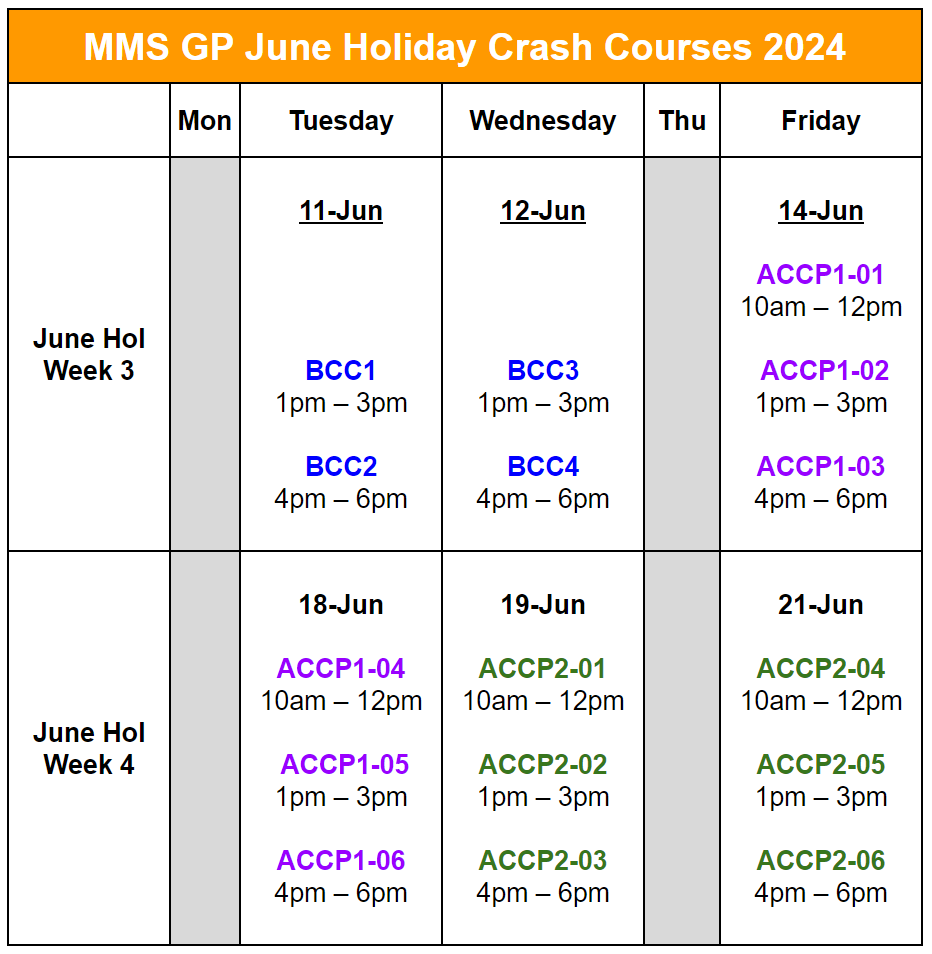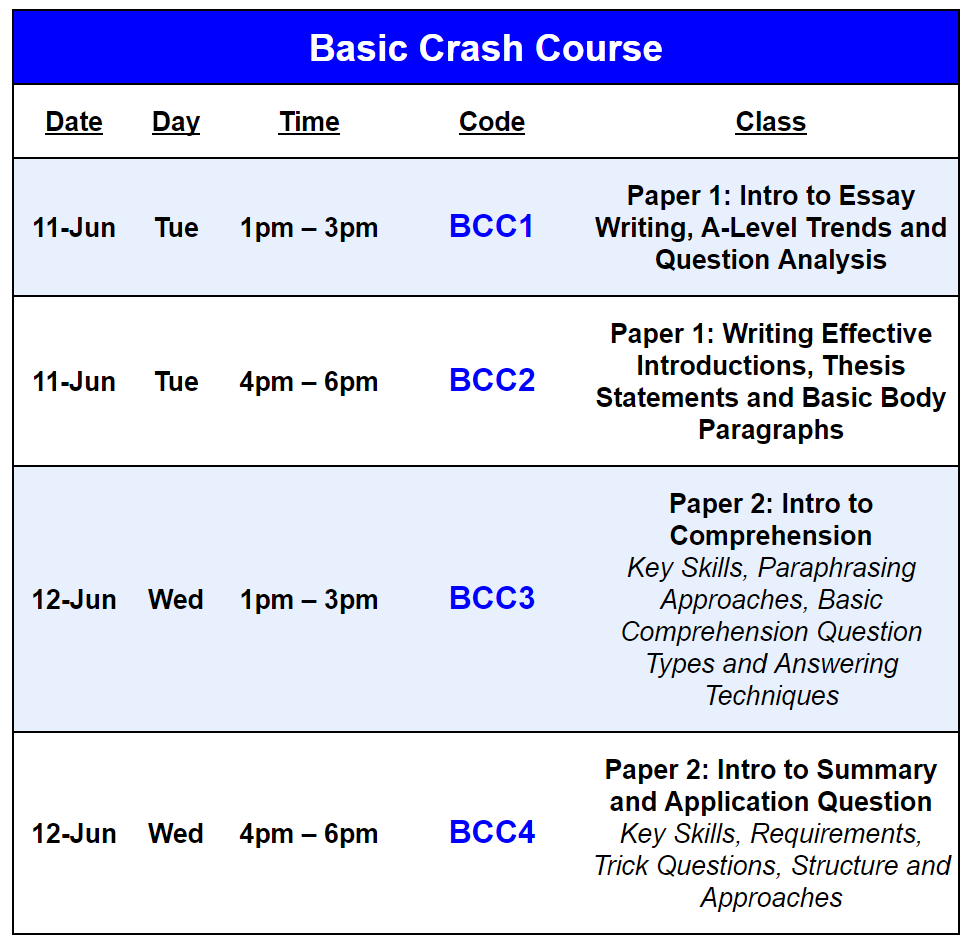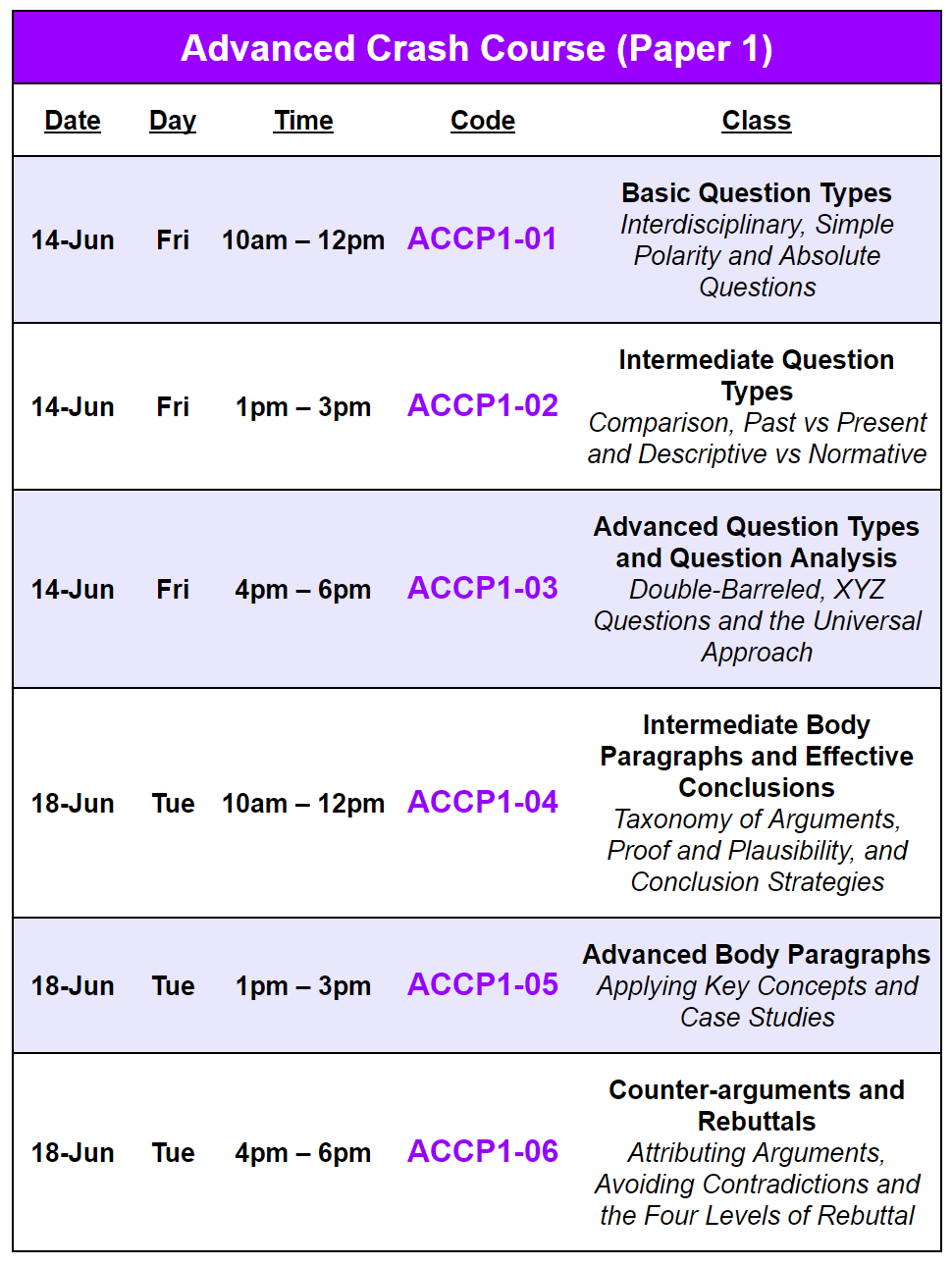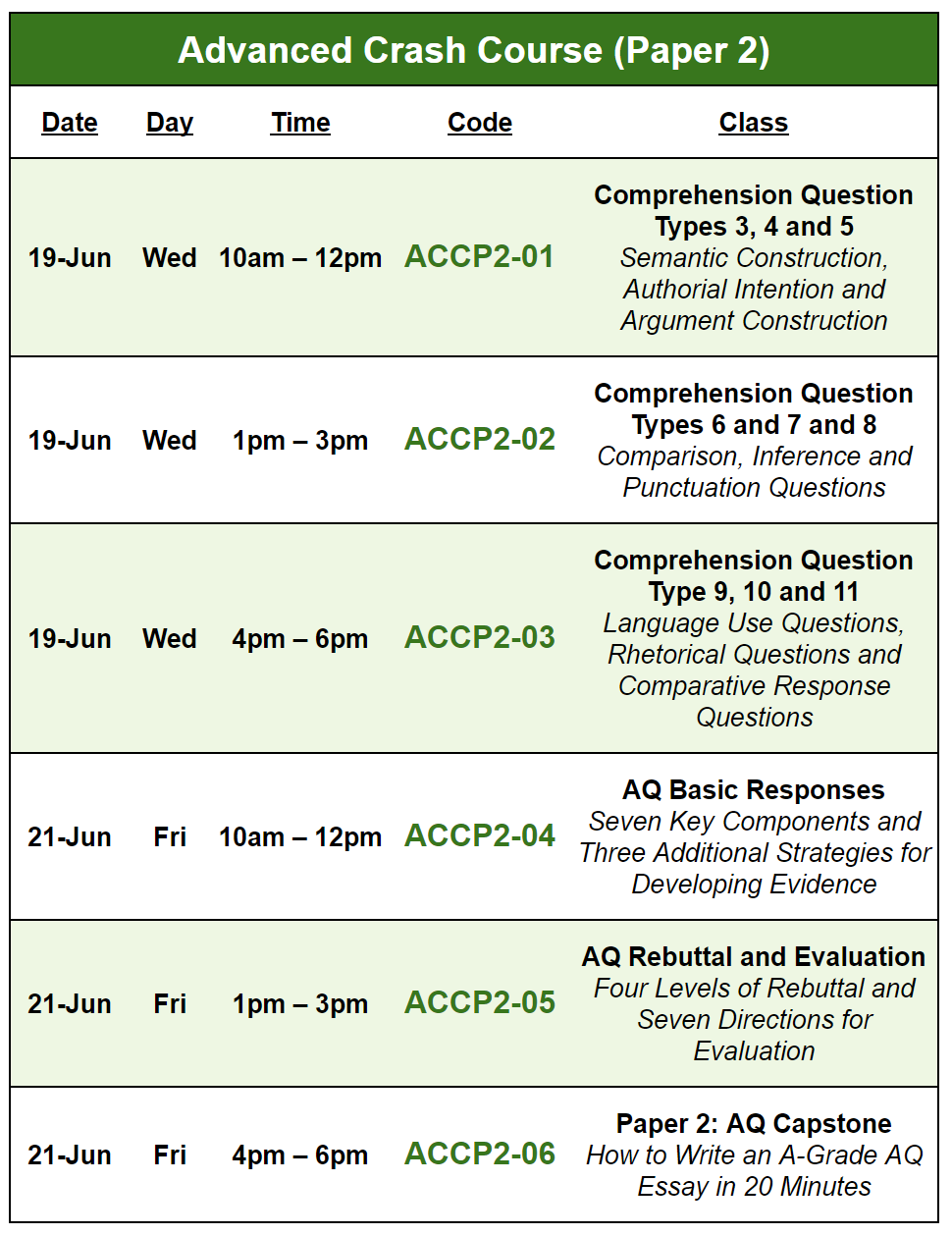MMS GP 2024 June Holiday Crash Courses
Key points
👉 Recordings are provided as part of the package. If you cannot attend some or all of the classes live, simply sign up first and you will get the recordings to watch or re-watch.
👉 If you wish to attend but are experiencing financial difficulties, please let me know.
👉 The crash courses are optional. Our regular classes will still continue as per usual.
👉 If you think your friends will benefit from this, feel free to forward these messages to them.
👉 Fees for the crash courses are heavily discounted for registered students.
About the Crash Courses
✅ The Advanced Crash Course covers more advanced skills.
How will the classes be conducted?
👍 Classes include in-class discussions, hands-on practices and worked illustrations.
👍 There will be opportunities for question and answer.
👍 All classes are conducted online.
👍 Extensive notes will be provided.
👍 Recordings will be provided.
Who should attend?
Students who:
💙 Joined us late
💙 Are still struggling with GP
💙 Are still unclear on certain parts of the subject
💙 Simply need more practice
💙 Are looking to gain a better grasp of the essential skills whilst learning some new content
Since I am already attending the regular classes, why must I attend this crash course?
🟨 The crash courses are meant for students who need some additional help and guidance. They are not compulsory.




Basic Crash Course
BCC1 — Paper 1: Intro to Essay Writing, A-Level Trends and Question Analysis
🔵Standard requirements, approach, structure and common topics
🔵A-Level trends and interdisciplinary questions
🔵Question selection, brainstorming, examining keywords and identifying assumptions
BCC2 — Paper 1: Writing Effective Introductions, Thesis Statements and Basic Body Paragraphs
🔵Writing effective introductions (avoiding common mistakes, hook, connection and contextualisation)
🔵Thesis statement (accepted forms, variations and expectations)
🔵Basic body paragraphs (structure, components, and the five types of evidence)
BCC3 — Paper 2: Intro to Comprehension (Key Skills, Paraphrasing Approaches, Basic Comprehension Question Types and Answering Techniques)
🔵Key comprehension skills (critical reading, pre-reading, skimming, scanning, understanding and parsing arguments)
🔵Paraphrasing approaches (three essential methods)
🔵Answering techniques for type 1 and type 2 questions
BCC4 — Paper 2: Intro to Summary and Application Question (Key Skills, Requirements, Trick Questions, Structure and Approaches)
🔵Key summary skills (question analysis, identifying relevant points, choosing optimal points, paraphrasing strategies)
🔵Application question requirements, trick questions, common topics and A-Level trends
🔵AQ response structure, priorities, approaches, inverted tree analysis, introduction and conclusion
Advanced Crash Course Paper 1
ACCP1-01 — Paper 1: Basic Question Types
🟣 Interdisciplinary, Simple Polarity and Absolute Questions
🟣 How to break down, identify and respond to different question types
🟣 Worked illustrations, examples and hands-on practices
🟣 Learn how to remain on point and score for Paper 1
ACCP1-02 — Paper 1: Intermediate Question Types
🟣 Comparison, Past vs Present and Descriptive vs Normative
🟣 How to break down, identify and respond to different question types
🟣 Worked illustrations, examples and hands-on practices
🟣 Learn how to remain on point and score for Paper 1
ACCP1-03 — Paper 1: Advanced Question Types and Question Analysis
🟣 Double-Barreled, XYZ Questions and the Universal Approach
🟣 How to break down, identify and respond to different question types
🟣 Worked illustrations, examples and hands-on practices
🟣 Learn how to remain on point and score for Paper 1
ACCP1-04 — Paper 1: Intermediate Body Paragraphs and Effective Conclusions
🟣 Taxonomy of Arguments, Proof and Plausibility, and Conclusion Strategies
🟣 Body paragraphs (taxonomy of arguments, interleaving evidence, and establishing proof and plausibility)
🟣 Effective conclusions (synthesis, emphasis, final analysis and hamburger strategies)
🟣 Learn how to develop coherent arguments progressively
ACCP1-05 — Paper 1: Advanced Body Paragraphs
🟣 Applying Key Concepts and Case Studies
🟣 Bring your essay to the next level by demonstrating in-depth conceptual knowledge
🟣 Use case studies to beef up evidence and offer unique insights
🟣 Learn how to get an edge over your peers with superior arguments
ACCP1-06 — Paper 1: Counter-arguments and Rebuttals
🟣 Attributing Arguments, Avoiding Contradictions and the Four Levels of Rebuttal
🟣 How to write counter-arguments without contradicting yourself
🟣 Four different strategies for crafting effective rebuttals
🟣 Learn how to use rebuttals to make your essay even more compelling and persuasive
Advanced Crash Course Paper 2
ACCP2-01 — Paper 2: Comprehension Question Types 3, 4 and 5
🟢 Semantic Construction, Authorial Intention and Argument Construction
🟢 Learn how to identify and meet the requirements of the question
🟢 On-the-spot exercises with feedback
🟢 Key answering techniques
ACCP2-02 — Paper 2: Comprehension Question Types 6 and 7 and 8
🟢 Comparison, Inference and Punctuation Questions
🟢 Learn how to identify and meet the requirements of the question
🟢 On-the-spot exercises with feedback
🟢 Key answering techniques
ACCP2-03 — Paper 2: Comprehension Question Type 9, 10 and 11
🟢 Language Use Questions, Rhetorical Questions and Comparative Response Questions
🟢 Learn how to identify and meet the requirements of the question
🟢 On-the-spot exercises with feedback
🟢 Key answering techniques
ACCP2-04 — Paper 2: AQ Basic Responses
🟢 Seven Key Components and Three Additional Strategies for Developing Evidence
🟢 Identifying relevant points, articulating the author’s arguments, defining your position, providing context, discussing singapore’s characteristics, offering supporting evidence and enhancing your argument with compelling analysis
🟢 Learn all the essential elements of an AQ response
🟢 Learn how to support your points with various types of evidence
ACCP2-05 — Paper 2: AQ Rebuttal and Evaluation
🟢 Four Levels of Rebuttal and Seven Directions for Evaluation
🟢 Learn how to deconstruct and demolish arguments at four different levels
🟢 Learn how to offer seven different types of evaluation
🟢 Enhance your AQ response and secure a top grade
ACCP2-06 — Paper 2: AQ Capstone
🟢 How to Write an A-Grade AQ Essay in 20 Minutes
🟢 Learn how to complete your AQ response in under 20 minutes
🟢 Tips and tricks for finishing fast
🟢 On-the-spot exercises with feedback

Fee for registered students
🟢 $320 for Basic Crash Course ($80/session)
🟢 $480 for Advanced Crash Course Paper 1 ($80/session)
🟢 $480 for Advanced Crash Course Paper 2 ($80/session)
🟢 $880 for Full Package (BCC + ACCP1 + ACCP2) ($60/session) [Recommended!]
Fee for non-registered students
🟢 $480 for Basic Crash Course ($120/session)
🟢 $720 for Advanced Crash Course Paper 1 ($120/session)
🟢 $720 for Advanced Crash Course Paper 2 ($120/session)
🟢 $1440 for Full Package (BCC + ACCP1 + ACCP2) ($90/session) [Recommended!]
Recordings
How to join the class
💻 Classes will be conducted on our Learning Management System.
💻 A laptop/PC with internet access is required for the class.
💻 The link to the class will be provided after payment has been confirmed.
Financial Aid Amount and Eligibility (For Registered Students Only)
Tier 1
🏷️ 50% off BCC / ACCP1 / ACCP2
🏷️ 65% off Full Package (BCC + ACCP1 + ACCP2)
🏷️ BCC — $160 (U.P. $320)
🏷️ ACCP1 — $240 (U.P. $480)
🏷️ ACCP2 — $240 (U.P. $480)
🏷️ Full Package (BCC + ACCP1 + ACCP2) — $440 (U.P. $1280)
Eligibility for Tier 1
👉 Student currently or previously on FAS
👉 Please provide a screenshot or picture of any documentation that shows that you are or were once on the Financial Assistance Scheme (FAS).
Tier 2
🏷️ 25% off BCC / ACCP1 / ACCP2
🏷️ 48% off Full Package (BCC + ACCP1 + ACCP2)
🏷️ BCC — $240 (U.P. $320)
🏷️ ACCP1 — $360 (U.P. $480)
🏷️ ACCP2 — $360 (U.P. $480)
🏷️ Full Package (BCC + ACCP1 + ACCP2) — $660 (U.P. $1280)
Eligibility for Tier 2
👉 Total household income under $6,000 (or household income per capita under $1,500)
👉 Household income = total income of all household members.
👉 Household income per capita = total income divided by number of household members.
👉 E.g. household income per capita of a five member household, with a total income of $7,500, is $1,500 ($7,500 ➗ 5 = $1,500)
👉 All we require is a self-declaration on a good faith basis
👉 No supporting documents required
Note: If you do not meet the requirements but nevertheless wish to apply, please opt for the “Appeal” option. We do not ask for any information or documentation regarding your actual household income.
How to Apply for Financial Aid
Kindly fill up the form. There is a section at the end of the last page where you can apply for financial aid.
Financial Aid Appeal
If you require financial aid but do not meet the requirements outlined above, please choose the “Appeal” option on the form. After that, please drop Mr Liau a WhatsApp message at 91781642. We do not ask for any information or documentation regarding your actual household income.
Financial Aid for Non-Registered Students
If you are not a registered student, you may still receive financial aid if you register before or after the crash course. We will also grant financial aid on a case-by-case basis to non-registered students who are unable to register. Please select the “Appeal” option.
Payment details
You may PayNow me directly at this number 91781642
PayNow is preferred for faster confirmations.
If you do not have PayNow, you can also use PayLah or do a bank transfer to this account:
DBS Current Account
120-319186-4
Invite your friends
Sharing is caring. If you have friends who are still struggling with GP, you can invite them to sign up for these extra classes as well.
Simply send them this link to register: https://forms.gle/gva7jgyhNhUBYtzM7

